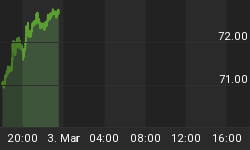Signs Of The Times:
"It's the best of all worlds, global growth is strong and the dollar is weak."
Wall Street Journal April 27
Chief Market Strategist at Bank of America
However, there are some observers who are becoming concerned. A piece in WSJ.com on April 30 provided an outstanding review of over-employed leverage, or as it is euphemistically called - liquidity.
Hedge-fund manager John Paulson made $1 billion using a complex financial instrument to pump up a bet that the subprime mortgage market would crater. The parent company of retail giant Sears made $74 million using a similar device to boost its wager that a basket of stocks would rise in value.
Both were playing with leverage - the magical power that allows investors to make big investments without putting big money on the table. These days, they have lots of company. Thanks to advances in financial engineering, investors have never had so many different ways to make commitments that exceed their bankrolls. And never before has leverage wormed its way into so many nooks of the financial world.
We're living on planet leverage, and regulators and market gurus are growing nervous.
How did this happen? For starters, hedge funds and leveraged-buyout funds have proliferated. They're pioneers in boosting returns using borrowed money, the most traditional form of leverage. Also, investment banks are pumping out newfangled leveraging tools such as derivatives, complex securities that allow hedge funds and other investors to add leverage without borrowing money.
The kicker, of course takes us one step beyond the liquidity euphemism into the surreal with the convenience of being able to "add leverage without borrowing money".
Recently, Warren Buffett has warned that widespread use of derivatives is endangering the financial system and observed "It's easy to put on leverage, but not as easy to take it off."
On April 4 the Financial Post had an article that included "the rapid evolution of products" and that "The new strategies include collateralized loan obligations, currencies and credit-default swaps."
In returning to the WSJ.com article which also noted that dealers offer "derivatives in dizzying variety. The values of some are tied to single stocks, others to baskets of stocks or market indexes, still others to bonds, oil, or even the weather."
And exemplifying another piece of financial jargon Buffett is quoted again, "total-return swaps make a mockery of margin requirements."
The important thing to be noted is that this is not the first time that financial innovation has inspired new instruments, and when it arrives - chagrin.
The earliest huge mania that was complete with all the miracles of financial innovation was the South Sea Bubble of 1720. Bitter disappointment followed and was nicely recorded for posterity:
"the English Nation run a madding after new inventions, whims, and projects [promotions], that impoverish, fiddle them out of their money, by the strange, un-heard-of engines of discount, transfers, tallies, debentures, shares, projects, and the devil and all figures and hard names."
That bubble peaked in May to June of that fateful year. The market drifted with weak rallies during the summer and crashed in the fall. The South Sea Company, which was the big-cap wonder, crashed from a high of 1000 to only 120 in only six months.
















